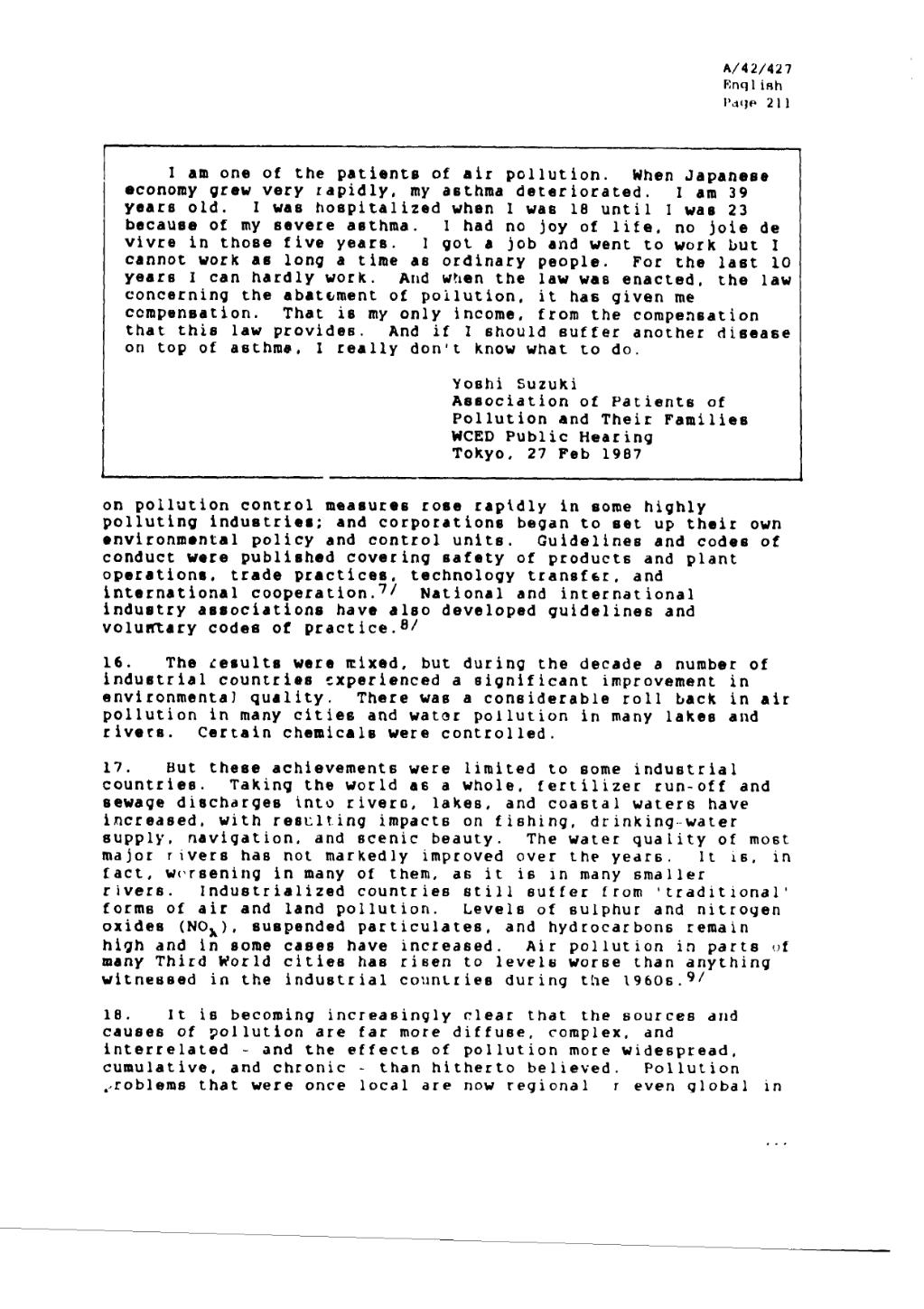A/42/427
English
Page 211
I am one of the patients of air pollution. When Japanese economy grew very rapidly, my asthma deteriorated. I am 39 years old. I was hospitalized when I was 18 until I was 23 because of my severe asthma. I had no joy of life, no joie de vivre in those five years. I got a job and went to work but I cannot work as long a time as ordinary people. For the last 10 years I can hardly work. Aid when the law was enacted, the law concerning the abatement of pollution, it has given me compensation. That is my only income, from the compensation that this law provides. And if I should suffer another disease on top of asthma, I really don't know what to do.
Yeshi Suzuki
Association of Patients of
Pollution and Their Families
WCED Public Hearing
Tokyo, 27 Feb 1987
on pollution control measures rose rapidly in some highly polluting industries; and corporations began to set up their own environmental policy and control units. Guidelines and codes of conduct were published covering safety of products and plant operations, trade practices, technology transfer, and international cooperation.[1]National and international industry associations have also developed guidelines and voluntary codes of practice.[2]
16. The results were mixed, but during the decade a number of industrial countries experienced a significant improvement in environmental quality. There was a considerable roll back in air pollution in many cities and water pollution in many lakes and rives. Certain chemicals were controlled.
17. But these achievements were limited to some industrial countries. Taking the world as a whole, fertilizer run-off and sewage discharges into rivers, lakes, and coastal waters have increased. with resulting impacts on fishing, drinking-water supply, navigation, and scenic beauty. The water quality of most major rivers has not markedly improved over the years. It is, in fact, worsening in many of them, as it is in many smaller rivers. Industrialized countries still suffer from 'traditional' forms of air and land pollution. Levels of sulphur and nitrogen oxides (NOV), suspended particulates, and hydrocarbons remain high and in some cases have increased. Air pollution in parts of many Third World cities has risen to levels worse than anything witnessed in the industrial countries during the 19606.[3]
18. It is becoming increasingly clear that the sources and causes of pollution are far more diffuse, complex, and interrelated – and the effects of pollution more widespread, cumulative, and chronic – than hitherto believed. Pollution problems that ere once local are no regional or even global in
- ↑ The UN Commission on Transnational Corporations has been working on a comprehensive code since 1977 but the sections on environmental and consumer protection have been virtually agreed. For other examples, see FAG. 'Code of Conduct on the Distribution and Use of Pesticides', Rome, 1985; UNEP, 'Guidelines on Risk Management and Accident Prevention in the Chemical Industry'. adopted in 1982; and OECD. 'Declaration of OECD Member Countries on International Investment and Multinational Enterprise'. 1976. and 'Clarification of the Environmental Concerns Expressed in Paragraph 2 of the General Policies Chapter of the OECD Guidelines for Multinational Enterprises'. Paris. 1985.
- ↑ See. for example, International Chamber of Commerce, 'Environmental Guidelines for World Industry', Paris, 1976 (revised in 1981 and 1986); Hellenic Marine Environment Protection Association, 'To Save the Seas, Declaration of a Voluntary Commitment' and 'Guidelines for the Officers of HELMEPA Member Vessels', Athens, 1982; and U.S. National Agricultural Chemicals Association. 'Guidelines on Labelling Practices for Pesticide Products in Developing Areas of the World'. Washington, DC. 1985.
- ↑ UNEP. State of the Environment 1982 (Nairobi: 1982).
